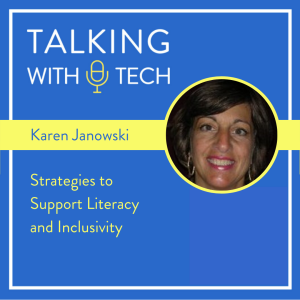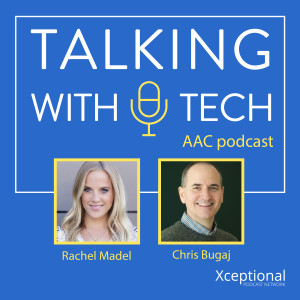
This week, Chris interviews Karen Janowski! Karen is an inclusive technology and assistive technology specialist who is also co-author of Chris’s new book, Inclusive 365. In the interview, they discuss some of the many ways that we can support literacy for all and make classrooms more accessible to all students (e.g. audio supports, digital texts that can be read aloud, etc).
Before the interview, Chris shares about a former student he has worked with who is moving to a new situation that does not support robust AAC. Chris discusses why this was such a disappointment, and how this experience motivates him to better support the students that he works with now. Rachel talks about the difficulty of supporting students who don’t make progress and/or have AAC taken away from them.
Key ideas this week:
🔑 General education teachers should choose inclusive instructional methods and ways for learners to demonstrate what they know, even if those students are in special ed.
🔑 Student-selected books for reading and self-selected topics for writing are very compelling for learners. Choice can really drive the love of learning. Writing for an authentic purpose (e.g. having learners write a letter asking for support for a cause that is important to them) can be very effective as well.
🔑 Worksheets are a classic example of an instructional output method that is limiting for many students. Worksheets are OK as an option, but we don’t want to require everyone to use them. For example, you could also choose an input option that allows dictation, keyboards, spell check, etc.
🔑 Start your thinking and planning with each learner's strengths in mind. Figure out what learners are best at and what they love to plan activities that are more motivating.
Resources
Book Creator - bookcreator.com
Seesaw - web.seesaw.me
Inclusive 365 book site: inclusive365.com
More Episodes
 2022-07-06
2022-07-06
 6.2k
6.2k
 2022-06-16
2022-06-16
 4.8k
4.8k
 2022-05-04
2022-05-04
 5.0k
5.0k
 2022-04-27
2022-04-27
 6.9k
6.9k
 2022-03-16
2022-03-16
 5.9k
5.9k
Create your
podcast in
minutes
- Full-featured podcast site
- Unlimited storage and bandwidth
- Comprehensive podcast stats
- Distribute to Apple Podcasts, Spotify, and more
- Make money with your podcast
It is Free
- Privacy Policy
- Cookie Policy
- Terms of Use
- Consent Preferences
- Copyright © 2015-2024 Podbean.com






